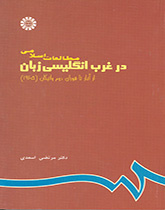
Islamic Studies in English Language Countries in West
Islamic Studies in the West, which has sometimes been interpreted as Orientalism, has generally had a negative and sometimes hated resonance for many Muslims, especially in Iran. This trend, namely, Islamic studies in the West, is inherently anti-Islamic and has an anti-Islamic origin because it is quite obvious that it is explicitly a continuation of other crusades, and in the post-Renaissance period, other anti-religious or anti-Islamic tendencies, such as the humanist approach to the religion or colonial approach has been contaminated with Islamic and Eastern studies in general and the like. However, the whole record of this long and multi-hundred-year course of study, which has not been ineffective in the development of anti-religious or non-religious intellectualism in the Islamic world, has not been limited in such negative ways. The severity of the stubbornness and anti-Islamism of some of those interested in Islamic studies in the West, on the other hand, has provoked an irreconcilable reaction and perception among many Muslims. With the final failure of the Crusades, which was the culmination of the Christian West's hostility to Islam and Muslims, a new and meaningful phase of this widespread hostility began, providing the first grounds and motivations for a series of activities now known as Islamic studies. This research includes a historical study on the evolution of Islamic studies in the English-speaking West up to 1965, in which more than two hundred works in Persian, Arabic and English have been referred to. The subject of the present book is studying the history of the development and evolution of the cultural approach of non-Muslims to confront Islam and its evolution into current Islamic studies, in its most extensive linguistic structure, namely in English.
2nd Rank in the 5th Researchers in the Field of Religion and Culture Aaward, 2003




